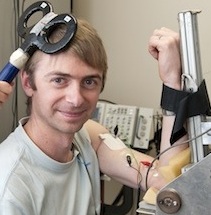Related Questions
- is it true that when a pigeon eats panadol it blows up?!
- did you play any sport as a kid or did you just do science experiments?
- What is the best way to lose weight?
- When you conduct experiments on yourself are there any side effects than you have experienced?
- can you get fat by not eating enough calories and fat, if so how does this work ?








Lactic acid is produced in your body all the time, and is broken down naturally in a reaction that also uses oxygen. When you’re exercising you use up heaps of oxygen, and so there isn’t enough to break down all the lactic acid completely and so lactic acid gets turned into lactate. And it is actually the lactate that causes sharp muscle aches and pains.
Lactic acid is usually cleared from your body in about 30 – 60 minutes, so I don’t think there are any long term effects of lactic acid build up on your health.
1
Lactic acid is produced when the muscle makes energy without oxygen. This is a normal part of exercise and is refereed to as the anaerobic phase. Normally what happens is the lactic acid builds up a little, then the oxygen arrives and it is dealt with by the body. However if you are doing lots of short burst exercise (which is anaerobic) like sprinting, weight lifting, etc, the lactic acid can build up a bit more than usual. This generally leads to weakness and pain in the muscle so you stop exercising and then the oxygen arrives and it’s sorted out. If you push really hard, the acid builds up, causing your blood pH to drop and if that goes to far the body deals with it by making you vomit to get rid of some acid.
Lactic acid generation is a normal part of exercise and normally should not cause you problems because you body has ways of dealing with it. Elite athletes can have problems with it interfering in their sport, even they don’t get long term effect on their health.
1